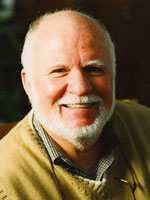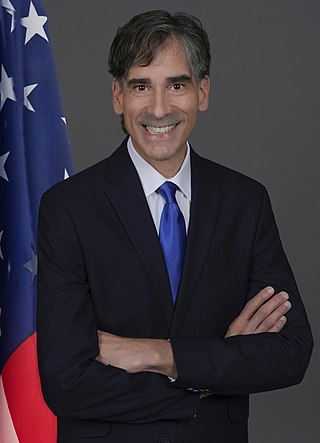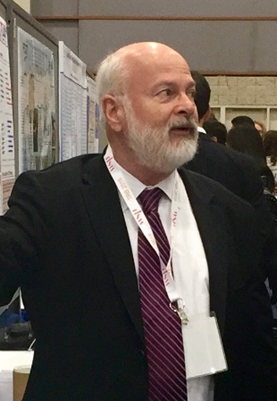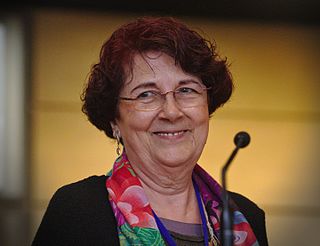Lloyd Viel Berkner was an American physicist and engineer. He was one of the inventors of the measuring device that since has become standard at ionospheric stations because it measures the height and electron density of the ionosphere. The data obtained in the worldwide net of such instruments were important for the developing theory of short wave radio propagation to which Berkner himself gave important contributions.

Finn Erling Kydland is a Norwegian economist known for his contributions to business cycle theory. He is the Henley Professor of Economics at the University of California, Santa Barbara. He also holds the Richard P. Simmons Distinguished Professorship at the Tepper School of Business of Carnegie Mellon University, where he earned his PhD, and a part-time position at the Norwegian School of Economics (NHH). Kydland was a co-recipient of the 2004 Nobel Memorial Prize in Economics, with Edward C. Prescott, "for their contributions to dynamic macroeconomics: the time consistency of economic policy and the driving forces behind business cycles."
(Ivan) Jean Gottmann was a French Jewish geographer who was best known for his seminal study on the urban region of the Northeast megalopolis. His main contributions to human geography were in the sub-fields of urban, political, economic, historical and regional geography. His regional specializations ranged from France and the Mediterranean to the United States, Israel, and Japan.

David W. Harvey is a British-American academic best known for Marxist analyses that focus on urban geography as well as the economy more broadly. He is Distinguished Professor of anthropology and geography at the Graduate Center of the City University of New York (CUNY). Harvey has authored many books and essays that have been prominent in the development of modern geography as a discipline. He is a proponent of the idea of the right to the city.
William Louis Garrison (1924–2015) was an American geographer, transportation analyst and professor at the University of California, Berkeley. While at the Department of Geography, University of Washington in the 1950s, Garrison led the "quantitative revolution" in geography, which applied computers and statistics to the study of spatial problems. As such, he was one of the founders of regional science. Many of his students went on to become noted professors themselves, including: Brian Berry, Ronald Boyce, Duane Marble, Richard Morrill, John Nystuen, William Bunge, Michael Dacey, Arthur Getis, and Waldo Tobler. His transportation work focused on innovation, the deployment of modes and logistic curves, alternative vehicles and the future of the car.

Queen Elizabeth's High School is a co-educational grammar school in Gainsborough, Lincolnshire, England. The school, established in 1983, but with a timeline to 1589, is an amalgamation of the previous Gainsborough High School and Queen Elizabeth's Grammar School.
Ash Amin, is a British academic known for his writing on urban and regional development, contemporary cultural change, progressive politics, and the collaborative economy. He holds the 1931 chair at the Department of Geography, University of Cambridge. Since September 2015 he has held the post of foreign secretary of the British Academy.

Doreen Barbara Massey was a British social scientist and geographer. She specialized in Marxist geography, feminist geography, and cultural geography, as well as other topics. She was Professor of Geography at the Open University.

Vladimir L’vovich Kvint is a Russian-American economist and the Chair of the Department of Economic and Financial Strategy at the Moscow School of Economics of the Lomonosov Moscow State University. He is President of the International Academy of Emerging Markets. He is a Foreign Member of the Russian Academy of Sciences.

Billie Lee Turner II is an American geographer and human-environmental scientist, member of the National Academy of Sciences and other honorary institutions. Prominent among the third generation of the Berkeley School of Latin Americanist Geography and cultural ecological research, he has been a leader in bridging this work with the Chicago School of natural hazards and risk research. In August 2008, he took a position as the first Gilbert F. White Chair in Environment and Society at Arizona State University, where he is affiliated with the School of Geographical Sciences and Urban Planning and the School of Sustainability. In November 2015, he was named a Regent’s Professor, the highest faculty honor that can be bestowed by Arizona State University.
Yehua Dennis Wei is a Chinese-American geographer. He is a professor in the Department of Geography and a senior scholar in the Institute of Public and International Affairs at the University of Utah. His research has been funded by the NSF, Lincoln Institute of Land Policy, National Geographic Society, Ford Foundation and Natural Science Foundation of China (NSFC). He has received awards for research excellence from the NSFC, Association of American Geographers' (AAG) China, Asian and Regional Development and Planning Specialty Groups, and University of Wisconsin-Milwaukee.
Julian Wolpert is Bryant Professor Emeritus of Geography, Public Affairs, and Urban Planning at Princeton University's Woodrow Wilson School, where he taught from 1973 to 2005 and chaired the Program in Urban and Regional Planning. He was previously a member of the Regional Science Department at the University of Pennsylvania (1963–73).
Marvin Duane Nellis is an American educator, university administrator, and 21st president of Ohio University in Athens. He was previously the president of Texas Tech University and the University of Idaho. Nellis previously served as provost and senior vice president at Kansas State University, and dean of the Eberly College of Arts and Science at West Virginia University.
Meric Slover Gertler is a Canadian academic who has been serving as the 16th and current President of the University of Toronto since 2013. Previously, he served as dean of the Faculty of Arts and Science at the university from 2008 to 2013.
Brian Lees is an Australian geographer and was the editor-in-chief of the International Journal of Geographical Information Science.
Larry Stuart Bourne FRSC FCIP FRCGS DLitt DES is a Canadian academic geographer. He has been called a "leading expert on Canadian urban issues." Bourne's academic career has been based in geography/planning at the University of Toronto with interest primarily in North American cities.

Alexis Russell Piquero is a Cuban-American criminologist who is professor and chair of the Department of Sociology at the University of Miami, where he is also Arts & Sciences Distinguished Scholar. He previously served as the Ashbel Smith Professor of Criminology at the University of Texas at Dallas, where he was also the Associate Dean for Graduate Programs in the School of Economic, Political, and Policy Sciences. He has been ranked as the #1 criminologist in the world since 1996 by the number of peer-reviewed papers in criminology journals. In 2015, then-United States Attorney General Eric Holder appointed him to the Office of Justice Programs Science Advisory Board.

Arthur C. Nelson is an American urban planner, researcher and academic. He is Professor of Urban Planning and Real Estate Development at the University of Arizona.

Maria Dolors García Ramón is a Spanish geographer. She is emeritus professor of geography of the Autonomous University of Barcelona,
Daniel Sui is a Chinese American geographer/GIScientist and currently serves as the senior president and chief research & innovation officer at Virginia Tech. Sui previously served as vice chancellor for research & innovation at the University of Arkansas – Fayetteville and division director for social & economic sciences at the U.S. National Science Foundation.
Brian J.L. Berry, Nihil Sine Labore. An Autobiography. 2006.









